
Charlotte "Chattie" Cooper Sterry was an English female tennis player who won five singles titles at the Wimbledon Championships and in 1900 became Olympic champion. In winning in Paris on 11 July 1900, she became the first female Olympic tennis champion as well as the first individual female Olympic champion.
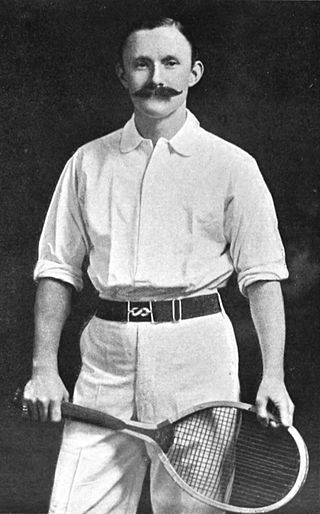
Arthur William Charles Wentworth Gore was a British tennis player.

Herbert Roper Barrett, KC was a tennis player from Great Britain.
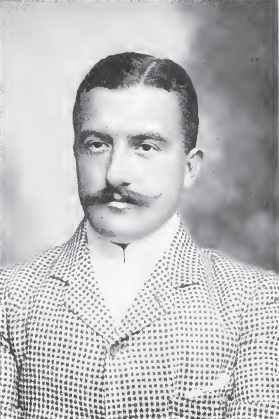
Wilberforce Vaughan Eaves MBE was an Australian-born tennis player from the United Kingdom. At the 1908 London Olympics he won a bronze medal in the Men's Singles tournament.

Harold Segerson Mahony was a Scottish-born Irish tennis player who is best known for winning the singles title at the Wimbledon Championships in 1896. His career lasted from 1888 until his death in 1905. Mahony was born in Scotland but lived in Ireland for the majority of his life; his family were Irish including both of his parents, the family home was in County Kerry, Southwestern Ireland. He was the last Scottish born man to win Wimbledon until the victory of Andy Murray at the 2013 championships.
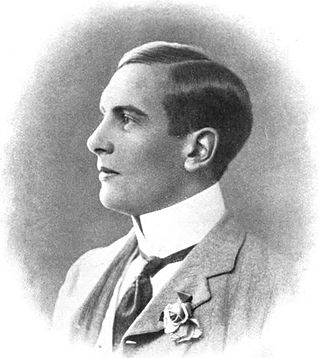
Frank Lorymer Riseley was a British tennis player. He was a three time Wimbledon singles finalist, two time Wimbledon doubles champion and won ten career singles titles.

The 1897 Wimbledon Championships was a tennis tournament that took place on the outdoor grass courts at the All England Lawn Tennis Club in Wimbledon, London, United Kingdom. The tournament ran from 21 June until 1 July. It was the 21st staging of the Wimbledon Championships, and the first Grand Slam tennis event of 1897. No matches were played on the first Tuesday to mark Queen Victoria's jubilee. Reginald Doherty defeated Harold Mahony in the Challenge Round, and successfully defended his title for the next three years.

Sydney Howard Smith was a British tennis and badminton player.

Hugh Laurence Doherty was a British tennis player and the younger brother of tennis player Reginald Doherty. He was a six-time Grand Slam champion and a double Olympic Gold medalist at the 1900 Summer Olympics in singles and doubles. In 1903 he became the first non-American player to win the U.S. National Championships.
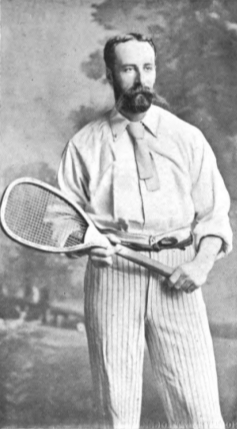
Herbert Chipp was an English tennis player. He was a Wimbledon singles and doubles semi finalist and won four career titles. He later became Honorary Secretary of the Lawn Tennis Association.
This article covers the period from 1877 to present. Before the beginning of the Open Era in April 1968, only amateurs were allowed to compete in established tennis tournaments, including the four Grand Slam tournaments. Wimbledon, the oldest of the majors, was founded in 1877, followed by the US Open in 1881, the French Open in 1891 and the Australian Open in 1905. Beginning in 1905 and continuing to the present day, all four majors have been played yearly, with the exception of during the two World Wars, 1986 for the Australian Open, and 2020 for Wimbledon. The Australian Open is the first major of the year (January), followed by the French Open (May–June), Wimbledon (June–July) and the US Open (August–September). There was no prize money and players were compensated for travel expenses only. A player who wins all four majors, in singles or as part of a doubles team, in the same calendar year is said to have achieved a "Grand Slam". If the player wins all four consecutively, but not in the same calendar year, it is called a "Non-Calendar Year Grand Slam". Winning all four at some point in a career, even if not consecutively, is referred to as a "Career Grand Slam". Winning the four majors and a gold medal in tennis at the Summer Olympics in the same calendar year has been called a "Golden Slam" since 1988. Winning all four majors plus an Olympic gold at some point in a career, even if not consecutively, is referred to as a "Career Golden Slam". Winning the year-end championship while also having won a Golden Slam is referred to as a "Super Slam". Winning all four majors, an Olympic gold, and the year-end championships at some point in a career, even if not consecutively, is referred to as a "Career Super Slam". Winning the four majors in all three disciplines a player is eligible for–singles, doubles and mixed doubles–is considered winning a "boxed set" of Grand Slam titles.
The Homburg Cup or Der Homburg-Pokal its original name was a tennis event held from 1894 through 1936 in Bad Homburg vor der Höhe, Germany on outdoor Clay court's.

The 1878 men's tennis season was composed of the third annual pre-open era tour. It now incorporated 15 tournaments staged in Great Britain and Ireland the Wimbledon championships was won by challenger Patrick Francis Hadow defeating the defending champion Spencer Gore.

The 1879 men's tennis season was composed of the fourth annual pre-open era tennis season and incorporated 26 tournaments. The 1879 Wimbledon Championships was won by John Hartley defending champion Patrick Francis Hadow, defending champion could not participate in the Challenge Round. This year saw the inaugural Irish Championships that in its early stages of development was considered as important that of the Wimbledon Championships the event was won by Vere St. Leger Goold who defeated in Charles David Barry in the final by Charles David Barry 8–6, 8–6. Important this year was the staging of six hard court tournaments some of which included the Dublin University Championships the East Gloucestershire Championships held in Cheltenham Great Britain, Nice Tennis Tournament in Nice, France and the first tournament to be held outside of Europe in Australia with the Victorian Championships.

The 1881 men's tennis season was composed of the sixth annual pre-open era tour now incorporated 73 tournaments staged in Australia, Canada, Great Britain and Ireland, and the United States. The 1881 Wimbledon Championships was won by William Renshaw. This year also saw the inaugural and important 1881 U.S. National Championships held at Newport Casino which Richard Sears won. This was also the year that the United States National Lawn Tennis Association, which is the world's first national tennis association, was founded. Renshaw then won two other big tournaments of the year, the Irish Lawn Tennis Championships and Princes Club Championships, whilst Richard Taswell Richardson won the prestigious Northern Championships.
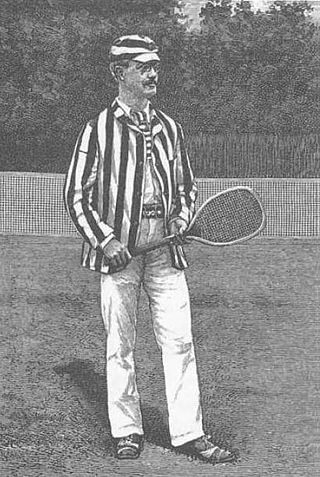
The 1882 men's tennis season was composed of the seventh annual tennis season and now incorporated 72 events. The Wimbledon Championships and Irish Championships was won by William Renshaw, the U.S. National Championships was won by Richard Sears collecting his second title other big winners were Richard Taswell Richardson picking up the Northern Lawn Tennis Championships and Ernest Renshaw winning the Princes Club Championships, The title leader this season was Robert W. Braddell winning 4 tournaments from 6 finals.

This was a tennis rivalry played between British player Arthur Gore and the New Zealand player Anthony Wilding, which in their respective careers met 14 times from 1905 until 1912.

The 1883 men's tennis season was the eighth annual tennis season, consisting of 71 tournaments. The Wimbledon Championships was won by William Renshaw for the third consecutive year, while Richard Sears continued his dominance at the U.S. National Championships also winning a third successive title. Other big winners this season were Ernest Renshaw, picking up the Irish Championships, Herbert Wilberforce winning the Northern Lawn Tennis Championships in Manchester, and Herbert Lawford collecting his second and final title at the Princes Club Championships. The title leader this season was Charles Walder Grinstead winning 5 tournaments from 6 finals.
Charles Gladstone Allen was a British tennis player in the early years of Wimbledon. He was an all comers finalist at 1896 Wimbledon Championships in men's doubles event partnering with his brother Roy Allen, where the lost to Reginald Doherty and Harold Nisbet. He was active from 1887 to 1914 and contested 17 career finals in singles and won 8 titles.
Arthur Wellesley Hallward was an English tennis player active during the 19th century. His best results in major tournaments came at the 1893 Wimbledon Championships where he was a losing quarter finalist in the men' singles, and 1896 where he was a losing quarter finalist in the 1896 Men's doubles. Between 1882 and 1898 he contested 7 career singles finals, and won 2 titles.















